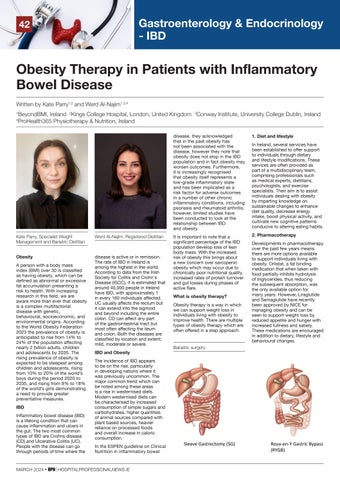Gastroenterology & Endocrinology - IBD
42
Obesity Therapy in Patients with Inflammatory Bowel Disease Written by Kate Parry1,2 and Werd Al-Najim1,3,4 BeyondBMI, Ireland 2Kings College Hospital, London, United Kingdom 3Conway Institute, University College Dublin, Ireland ProHealth365 Physiotherapy & Nutrition, Ireland
1 4
Kate Parry, Specialist Weight Management and Bariatric Dietitian
Werd Al-Najim, Registered Dietitian
Obesity
disease is active or in remission. The rate of IBD in Ireland is among the highest in the world. According to data from the Irish Society for Colitis and Crohn's Disease (ISCC), it is estimated that around 40,000 people in Ireland have IBD, with approximately 1 in every 160 individuals affected. UC usually affects the rectum but it can extend into the sigmoid and beyond including the entire colon. CD can affect any part of the gastrointestinal tract but most often affecting the ileum and colon. Both the diseases are classified by location and extent; mild, moderate or severe.
A person with a body mass index (BMI) over 30 is classified as having obesity, which can be defined as abnormal or excessive fat accumulation presenting a risk to health. With increasing research in this field, we are aware more than ever that obesity is a complex multifactorial disease with genetic, behavioural, socioeconomic, and environmental origins. According to the World Obesity Federation 2023 the prevalence of obesity is anticipated to rise from 14% to 24% of the population affecting nearly 2 billion adults, children and adolescents by 2035. The rising prevalence of obesity is expected to be steepest among children and adolescents, rising from 10% to 20% of the world’s boys during the period 2020 to 2035, and rising from 8% to 18% of the world’s girls demonstrating a need to provide greater preventative measures. IBD Inflammatory bowel disease (IBD) is a lifelong condition that can cause inflammation and ulcers in the gut. The two most common types of IBD are Crohns disease (CD) and Ulcerative Colitis (UC). People with the disease can go through periods of time where the
IBD and Obesity The incidence of IBD appears to be on the rise, particularly in developing nations where it was previously uncommon. The major common trend which can be noted among these areas is a rise in westernised diets. Modern westernised diets can be characterised by increased consumption of simple sugars and carbohydrates, higher quantities of animal sources compared with plant based sources, heavier reliance on processed foods and overall increase in caloric consumption. In the ESPEN guideline on Clinical Nutrition in inflammatory bowel
MARCH 2024 • HPN | HOSPITALPROFESSIONALNEWS.IE
disease, they acknowledged that in the past obesity has not been associated with the disease, however they note that obesity does not stop in the IBD population and in fact obesity may worsen outcomes. Furthermore, it is increasingly recognised that obesity itself represents a low-grade inflammatory state and has been implicated as a risk factor for adverse outcomes in a number of other chronic inflammatory conditions, including psoriasis and rheumatoid arthritis, however, limited studies have been conducted to look at the relationship between IBD and obesity.
1. Diet and lifestyle
It is important to note that a significant percentage of the IBD population develop loss of lean body mass. With the increased risk of obesity this brings about a new concern over sarcopenic obesity which may occur due to chronically poor nutritional quality, increased rates of protein turnover and gut losses during phases of active flare.
2. Pharmacotherapy
What is obesity therapy? Obesity therapy is a way in which we can support weight loss in individuals living with obesity to improve health. There are multiple types of obesity therapy which are often offered in a step approach.
In Ireland, several services have been established to offer support to individuals through dietary and lifestyle modifications. These services are often provided as part of a multidisciplinary team, comprising professionals such as medical experts, dietitians, psychologists, and exercise specialists. Their aim is to assist individuals dealing with obesity by imparting knowledge on sustainable changes to enhance diet quality, decrease energy intake, boost physical activity, and cultivate new cognitive patterns conducive to altering eating habits.
Developments in pharmacotherapy over the past few years means there are more options available to support individuals living with obesity. Orlistat, a fat binding medication that when taken with food partially inhibits hydrolysis of triglycerides, thus reducing the subsequent absorption, was the only available option for many years. However, Liraglutide and Semaglutide have recently been approved by NICE for managing obesity and can be seen to support weight loss by reduced appetite and hunger with increased fullness and satiety. These medications are encouraged in addition to dietary, lifestyle and behavioural changes.
Bariatric surgery
Sleeve Gastrectomy (SG)
Roux-en-Y Gastric Bypass (RYGB)
